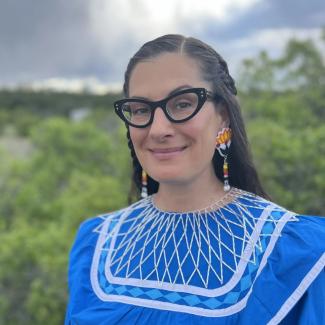
Halito akana (Hello friends),
As the world turns its attention to Belém do Pará, Brazil, the host site for the 30th Conference of the Parties on the United Nations Framework Convention on Climate Change (UNFCCC COP30) and home to many Indigenous Peoples, including Munduruku, Xipaya, Parakanã, Xikrin, Mebêngôkre, Tupinamba, among others, we are reflecting on the origins of Cultural Survival. In the 1950s and ‘60s, Cultural Survival’s founders, David and Pia Maybury-Lewis, were working with the Xavante and Xerente Peoples in the remote savannah of Mato Grosso, Brazil. They witnessed the “opening up” of the Brazilian interior and Amazonian regions and the devastating effects on Indigenous communities and wanted to “bear witness to a genocidal threat, to make the world aware of this process of destruction, and to try to stop it.” In 1972, David and Pia, along with Harvard colleagues Evon Vogt, Jr., and Orlando Patterson, started Cultural Survival with the goal of raising money for projects to support the Xavante Peoples. Today, their foundational mission is powerfully amplified through Cultural Survival as an Indigenous-led organization with 50 staff in 19 countries, working in solidarity with Indigenous Peoples around the world.
Yet, while Indigenous leaders, communities, and allies work unceasingly to secure and defend the rights of Indigenous Peoples with important achievements at the international level and in a few countries, Indigenous Peoples continue to face stark realities as their rights continue to be ignored and eroded. As we witness a global retreat from multilateralism and a rise of authoritarian regimes, governments and corporations around the world are racing to develop and extract resources from Indigenous territories.
This issue of the CSQ brings our focus back to Brazil and the voices of Indigenous leaders working to make Indigenous rights a reality. The integrity and biodiversity of Brazil’s rainforests and other ecosystems are stewarded by more than 300 Indigenous Peoples speaking over 270 languages and dialects, whose tremendous contributions to the health of Mother Earth are essential to the survival of humanity and the web of life. Indigenous Peoples have successfully fought for their rights to land, cultural lifeways, and autonomy to be protected in Brazil’s Federal Constitution. Barriers to implementation include a lack of demarcation, disputes over Indigenous territories, and new legislation and frameworks such as the “Marco Temporal” (time limit), which undermine secured rights and traditional stewardship. Indigenous people continue to face violence associated with territorial conflicts, deforestation, and mining. Edson Krenak (Krenak) writes more about these issues in his feature article.
Host of the 1992 Earth Summit, where the UNFCCC, the Convention on Biological Diversity, and the Convention to Combat Desertification were born, Brazil has played a foundational role in international environmental diplomacy. As the world falls behind on commitments to limit climate change, Brazil has a unique opportunity and responsibility to lead the world in promoting pathways for justly and equitably achieving the goals of the Paris Agreement through the UNFCCC’s Just Transition Work Program. To be successful, this must include protection of Indigenous Peoples’ rights, safeguarding of ecosystems, and explicit protections against destructive activities carried out in the name of the transition.
Cultural Survival will be at COP30 to follow the negotiations and uplift Indigenous voices that are bringing light to critical issues and pushing governments to do the right thing. Join us in our efforts to support and amplify the voices of Indigenous Peoples who safeguard knowledge systems, languages, and lifeways, and are leading the way to healing and securing a sustainable future for Mother Earth and all of us for generations to come. Please give generously at www.cs.org/donate.
Hטchi yakoke li hoke (I thank you all so much),
Aimee Roberson (Choctaw and Chickasaw), Executive Director
